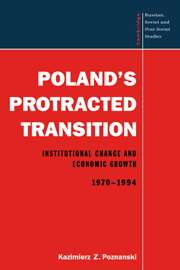Book contents
- Frontmatter
- Contents
- Preface
- Introduction: Research agenda, conceptual model and principal findings
- Part I Imperfect decentralization, broken political contracts and foreign-debt crisis
- 1 Import-led growth policy under ‘soft’ planning
- 2 Impact of technology imports on national economy
- 3 The constraining role of political factors
- Part II Economic reforms, divided society and ‘growth fatigue’
- Part III Communist legacy, ‘shock therapy’ and economic recession
- Appendix
- Notes
- References
- Index
- Titles in the series
1 - Import-led growth policy under ‘soft’ planning
Published online by Cambridge University Press: 29 October 2009
- Frontmatter
- Contents
- Preface
- Introduction: Research agenda, conceptual model and principal findings
- Part I Imperfect decentralization, broken political contracts and foreign-debt crisis
- 1 Import-led growth policy under ‘soft’ planning
- 2 Impact of technology imports on national economy
- 3 The constraining role of political factors
- Part II Economic reforms, divided society and ‘growth fatigue’
- Part III Communist legacy, ‘shock therapy’ and economic recession
- Appendix
- Notes
- References
- Index
- Titles in the series
Summary
The Gierek period has been typically analysed from the point of view of why his economic policies ultimately failed, i.e., what specific forces were responsible for the economic crisis of 1979–82. The period of extremely rapid growth in investment combined with unprecedented gains in real consumption, lasting from 1971 through 1976, and the following years of more modest output growth and wage increases, are usually viewed as a prelude to that crisis. The most common explanation for the economic downturn is that the foreign credits which made the early expansion possible were also responsible for the crisis. Poland borrowed too much, given its absorptive capability and low overall production efficiency. The above view is examined in this opening chapter and throughout the rest of the first part of the book.
The opening of the economy by Gierek's government at the end of 1971 is viewed here as a key element in his ambitious programme of growth expansion, driven not only by a desire to upgrade the ailing national economy but also to quickly raise the standard of living. However, the strategy of active imports - and Western credits, which made them possible - does not seem to be the exclusive, or even primary, cause of the subsequent crisis. Ineffective aggregate demand (income) management - wage-rate and price policies - are identified as additional, possibly more critical, factors responsible for the onset of economic difficulties in 1976, and for Poland's inability to soften the 1979–82 collapse (with some decline in production almost unavoidable due to shocks coming from world markets) (Poznanski 1986a).
- Type
- Chapter
- Information
- Poland's Protracted TransitionInstitutional Change and Economic Growth, 1970–1994, pp. 3 - 31Publisher: Cambridge University PressPrint publication year: 1997



